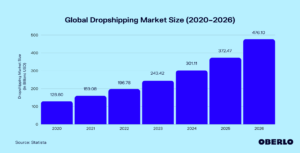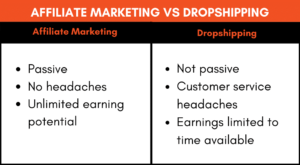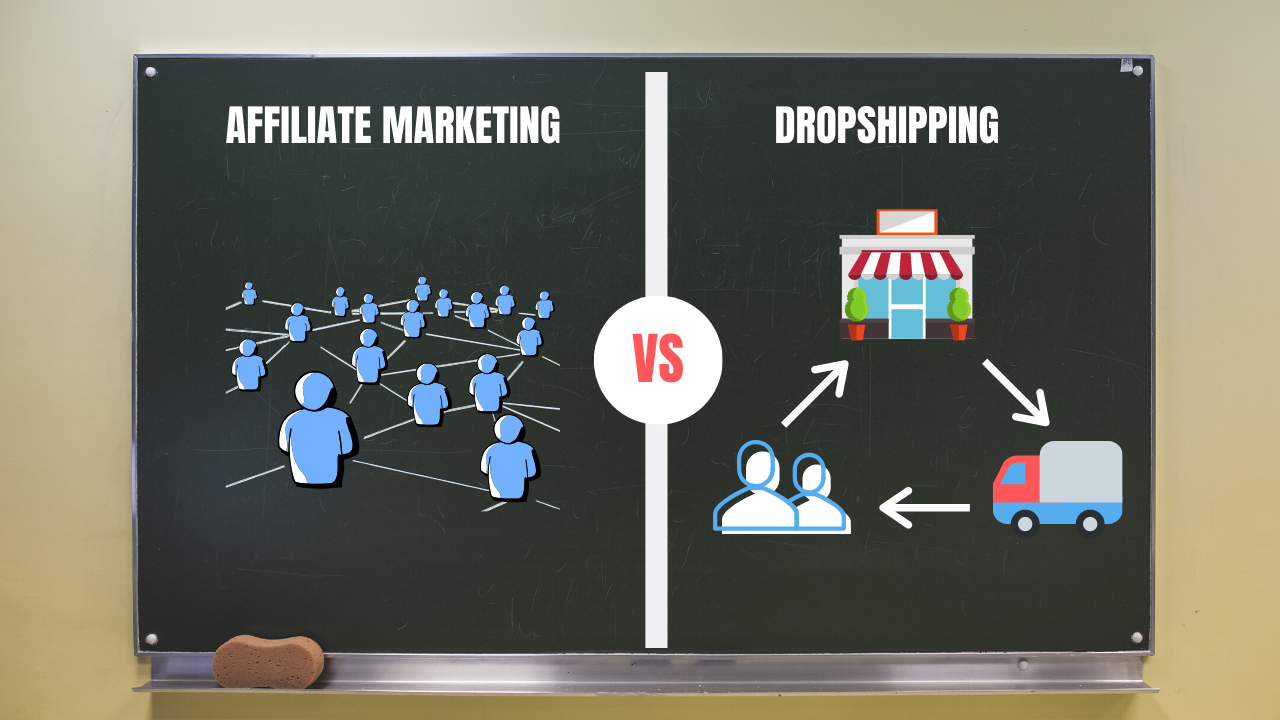Affiliate Marketing vs Dropshipping
As an entrepreneur looking to explore new business opportunities in 2024, it is crucial to understand the financial prospects of different business models. In this article, we will delve into the world of affiliate marketing and dropshipping, two popular online business models that have gained significant traction in recent years. By understanding the basics of affiliate marketing and dropshipping, as well as their advantages and disadvantages, we can make an informed decision about which business model is the right fit for 2024.
What is Affiliate Marketing? Understanding the Basics of Affiliate Marketing
 Affiliate marketing is a performance-based marketing technique where individuals or businesses promote products or services on behalf of another company. Amazon affiliate marketing and Pinterest affiliate marketing are two such examples, but there are many to choose from. In this model, affiliates earn a commission for every sale or lead generated through their marketing efforts. The key advantage of affiliate marketing is its simplicity. As an affiliate marketer, you don’t need to worry about product creation, inventory management, or customer support. Your main focus is on driving traffic and conversions.
Affiliate marketing is a performance-based marketing technique where individuals or businesses promote products or services on behalf of another company. Amazon affiliate marketing and Pinterest affiliate marketing are two such examples, but there are many to choose from. In this model, affiliates earn a commission for every sale or lead generated through their marketing efforts. The key advantage of affiliate marketing is its simplicity. As an affiliate marketer, you don’t need to worry about product creation, inventory management, or customer support. Your main focus is on driving traffic and conversions.
Affiliate marketing is a versatile business model that allows you to promote a wide range of products and services across various niches. Whether you have a passion for fashion, technology, or fitness, there are countless affiliate programs available to suit your interests. Additionally, affiliate marketing offers a high potential for passive income. Once you have set up your marketing channels and established a steady flow of traffic, you can continue to earn commissions even while you sleep.
However, it’s important to note that affiliate marketing does have its drawbacks. One major disadvantage is the reliance on the affiliate program itself. If the company you are affiliated with goes out of business or changes its commission structure, it can have a significant impact on your earnings. Additionally, the competition in the affiliate marketing space is fierce. With many affiliates vying for the same audience, it can be challenging to stand out and generate consistent income. If you would like to learn more about affiliate marketing, please read my review of the top ranked affiliate program Wealthy Affiliate.
How Big is Affiliate Marketing in Dollar Terms in 2024?
 According to a report by Influencer Marketing Hub, the affiliate marketing industry is set to grow to approximately $14.3 billion globally in 2023 and $15.7 billion by 2024. Another report by Demand Sage estimates that the market value of affiliate marketing is over $27.8 billion and the spending on affiliate marketing will be around $15.7 billion in 2024. So, if you are asking: does affiliate marketing work”? the answer is clearly YES!!
According to a report by Influencer Marketing Hub, the affiliate marketing industry is set to grow to approximately $14.3 billion globally in 2023 and $15.7 billion by 2024. Another report by Demand Sage estimates that the market value of affiliate marketing is over $27.8 billion and the spending on affiliate marketing will be around $15.7 billion in 2024. So, if you are asking: does affiliate marketing work”? the answer is clearly YES!!
What is Dropshipping?: Exploring the Concept of Dropshipping
Dropshipping is an e-commerce business model where entrepreneurs sell products without having to carry any inventory. Amazon dropshipping and Aliexpress dropshipping are two well know dropshipping suppliers Instead, when a store owner receives an order from a customer, they simply forward the details to the supplier, who then ships the products directly to the customer’s doorstep. The store owner never sees or handles the products, making dropshipping a convenient and low-risk option for aspiring entrepreneurs.
 One of the main advantages of having a dropshipping business is the minimal upfront investment required. Unlike traditional retail businesses that require significant capital to purchase inventory, in dropshipping, you only pay for the products once you’ve received payment from your customers. This allows entrepreneurs to start their online stores with little to no upfront cost. Additionally, dropshipping offers a wide product selection, as you can choose from thousands of products available from various suppliers.
One of the main advantages of having a dropshipping business is the minimal upfront investment required. Unlike traditional retail businesses that require significant capital to purchase inventory, in dropshipping, you only pay for the products once you’ve received payment from your customers. This allows entrepreneurs to start their online stores with little to no upfront cost. Additionally, dropshipping offers a wide product selection, as you can choose from thousands of products available from various suppliers.
However, dropshipping also has its downsides. One major disadvantage is the lack of control over the fulfillment process. Since you are relying on suppliers to handle shipping and delivery, you may encounter issues such as delayed shipments or poor product quality. These factors can negatively impact the customer experience and your reputation as a seller. Additionally, in a highly competitive market, finding profitable products can be a challenge, as many other dropshippers may be selling the same items.
How Big is Dropshipping in Dollar Terms in 2024?
 According to a report by Oberlo, the global dropshipping market is forecast to reach $301.11 billion in 2024, which is the first year it is set to surpass $300 billion, after a 23.7% increase from 2023’s numbers. Another report by Dropshipping.com estimates that the dropshipping market is expected to develop further, reaching $301.11 billion in 2024 and $372.47 billion in 2025. So, like affiliate marketing, there is potential for big earnings.
According to a report by Oberlo, the global dropshipping market is forecast to reach $301.11 billion in 2024, which is the first year it is set to surpass $300 billion, after a 23.7% increase from 2023’s numbers. Another report by Dropshipping.com estimates that the dropshipping market is expected to develop further, reaching $301.11 billion in 2024 and $372.47 billion in 2025. So, like affiliate marketing, there is potential for big earnings.
Advantages and Disadvantages of Affiliate Marketing
Pros:
- Minimal upfront investment: One of the pros of affiliate marketing is that it requires minimal upfront investment. This means that individuals with limited resources can easily get started without the need for a large capital investment.
- Opportunity for passive income: Another advantage of affiliate marketing is the potential for passive income. Once the marketing channels are set up and a steady flow of traffic is established, ongoing commissions can be earned without putting in much additional effort.
Cons:
- Dependence on traffic: A potential downside of affiliate marketing is that it relies heavily on generating traffic to your marketing channels. Without a consistent flow of visitors, it can be challenging to earn commissions.
- Limited control over products: As an affiliate marketer, you don’t have direct control over the products or services being promoted. This means that you may have little influence over the quality or functionality of the products, which could affect your reputation and credibility as a marketer.
Advantages and Disadvantages of Dropshipping
Pros:
- Minimal upfront investment: One of the biggest advantages of dropshipping is that it requires minimal upfront investment. This means entrepreneurs can start their business without needing to purchase inventory upfront. This reduces the financial risk associated with starting a traditional retail business.
- Flexibility and scalability: Dropshipping provides flexibility and scalability for entrepreneurs. As the business grows, entrepreneurs can easily expand their product range and reach a wider audience without the need for additional inventory or storage space. This allows for more opportunities for growth and increased revenue potential.
Cons:
- Lack of control over inventory: With dropshipping, the entrepreneur doesn’t have control over the inventory as they rely on suppliers to fulfill orders. This can lead to potential issues such as stockouts or shipping delays, which can negatively impact customer satisfaction and the overall reputation of the business.
- Lower profit margins: Since dropshipping involves working with suppliers, the entrepreneur may have to share a portion of the profit with them. This can result in lower profit margins compared to businesses that manufacture or stock their own products.
Comparison of Affiliate Marketing and Dropshipping in Terms of Profitability
When it comes to profitability, both affiliate marketing and dropshipping offer the potential for significant earnings. However, the profitability of each model depends on various factors such as the niche you choose, the products you promote, and your marketing strategies.
In affiliate marketing, your earnings are directly tied to the commission rates offered by the affiliate program. Some programs offer higher commission rates, allowing you to earn a larger percentage of the sale. On the other hand, dropshipping allows you to set your own prices, giving you more control over your profit margins. By finding the right suppliers and optimizing your pricing strategy, you can potentially achieve higher profitability in dropshipping.
Profitability of affiliate marketing vs dropshipping
Affiliate Marketing:
- Profit Margin: Typically ranges from 5% to 50%, depending on the product and the affiliate program.
- Initial Investment: Low to none, as there’s no need to purchase or hold inventory.
- Overhead Costs: Minimal, often limited to website hosting, marketing tools, and content creation.
- Potential for Scaling: High, as affiliate marketers can promote multiple products from different companies simultaneously.
Dropshipping:
- Profit Margin: Generally, ranges from 10% to 30%, with some niche products offering higher margins.
- Initial Investment: Moderate, as there may be costs associated with setting up an online store, advertising, and product sourcing.
- Overhead Costs: Relatively low, as there’s no need to hold inventory or manage a warehouse.
- Potential for Scaling: Moderate to high, depending on the niche and marketing strategies.
It’s important to note that these figures can vary significantly based on the specific products, target audience, and marketing efforts. Additionally, individual success in both affiliate marketing and dropshipping depends on effective marketing, product selection, and audience engagement.
Understanding the profit margins and cost structures of both affiliate marketing and dropshipping can help in making informed decisions when choosing a business model.
Comparison of Affiliate Marketing and Dropshipping in Terms of Investment and Risk
When considering investment and risk, affiliate marketing and dropshipping differ in their requirements and potential pitfalls. 
In affiliate marketing, the upfront investment is minimal. You can start promoting products through various online platforms without any cost. However, there is a certain level of risk involved, as your earnings depend on the success of the affiliate program and your ability to drive traffic and conversions. Additionally, there is a risk of program changes or closures, which can significantly impact your income.
In dropshipping, the upfront investment is also minimal, as you don’t need to purchase inventory upfront. However, there are other costs to consider, such as website development, marketing, and customer support. Additionally, there is a risk of supplier issues, such as delayed shipments or product quality problems. These factors can impact the customer experience and your reputation as a seller.
Future Trends and Predictions for Affiliate Marketing
As we look ahead to 2024, affiliate marketing is poised for continued growth and innovation. The rise of social media and influencer marketing has opened up new avenues for affiliate promotion. We can expect to see more collaborations between brands and influencers, as well as an increased focus on personalized and targeted marketing. Additionally, advancements in technology, such as artificial intelligence and machine learning, will provide new opportunities for affiliate marketers to optimize their campaigns and drive better results.
Future Trends and Predictions for Dropshipping
In the future, dropshipping is expected to continue its upward trajectory as more entrepreneurs seek to start their own e-commerce businesses. We can expect to see advancements in automation and fulfillment technology, making the dropshipping process more efficient and streamlined. Additionally, there will likely be an increased emphasis on sustainability and ethical sourcing, as consumers become more conscious of their purchasing decisions. As the market becomes more competitive, successful dropshippers will need to focus on building strong brands and providing exceptional customer experiences.
Strategic Insights: Choosing the Right Path for Your E-Commerce Empire
So, you’ve taken a close look at both affiliate marketing and dropshipping. By now, you might have a gut feeling about which path is right for you. Remember, this isn’t just about immediate profitability; it’s also about where you see yourself in the e-commerce landscape.
Consider your personal strengths, resources at hand, and long-term aspirations. Are you someone who excels at marketing and building relationships? Affiliate marketing could play to your strengths. Or do you have a knack for curating products and managing customer relations? Then dropshipping might be your arena.
Choosing something that resonates with you is crucial. Beyond just the starting costs and profit margins, think about your willingness to handle inventory, deal with customer service, and invest time into building a brand.
It’s important to note that the e-commerce world is dynamic—what works today might need tweaking tomorrow. You can always adjust your approach down the road, but make sure to lay a solid foundation based on thorough research and self-reflection.
In my opinion, there’s no definitive answer to which is more profitable in 2024. Your success depends on how you leverage each model’s advantages while skillfully navigating their challenges. And don’t worry too much about perfection on your first attempt—progression is key.
To wrap it up, both affiliate marketing and dropshipping offer exciting opportunities. They each come with unique benefits and potential for financial reward. The question is, which opportunity has your name written on it? I’m here to tell you that with due diligence and passion, your first venture into e-commerce doesn’t need to be your last. So, choose wisely, work smart, and cherish the journey. I really hope that you find success and fulfilment in whichever path you choose.
Ready to embark on your online business journey? Take the first step and start exploring the world of affiliate marketing and dropshipping today!
I’d love to get your thoughts on either affiliate marketing or dropshipping or both. Leave a comment when you can.
regards,
Bernard
Co-Founder of Empower Marketing


This is an interesting comparison of affiliate marketing versus dropshipping. Anybody wondering which one of the two is better for them, will find this guide very helpful.
Although both offer online earning opportunities, they are slightly different, with the main difference being that you do not earn passive income with dropshipping. So if you want passive income, then affiliate marketing would be the better choice.
Thank you for making it easier to make a decision between the two marketing options.
Hi,
Thank you for the comment. I almost went the way of dropshipping but I resonated more with affiliate marketing. I’m glad you found the article useful. I’m planning on doing a series comparing affiliate marketing vs other online businesses. Stay tuned.
regards
Bernard
Hey Bernard! This was a very awesome comparison of Affiliate Marketing vs Drop Shipping. I personally prefer Affiliate Marketing because of the passive income opportunities and lack of shipping and customer service headaches. I started my entrepreneurial career in Network Marketing and found Affiliate Marketing by accident looking for a way to be found on Google for free. I am so glad I did. It has changed my life for the better and continues to improve all the time.
Hey Robin! I’m glad you enjoyed the comparison. It’s fantastic to hear about your positive experience with Affiliate Marketing. The passive income and freedom from shipping and customer service definitely make it an appealing option. It’s inspiring to hear how it’s transformed your life for the better. Keep up the great work, and here’s to continued success in your entrepreneurial journey!
regards
Bernard